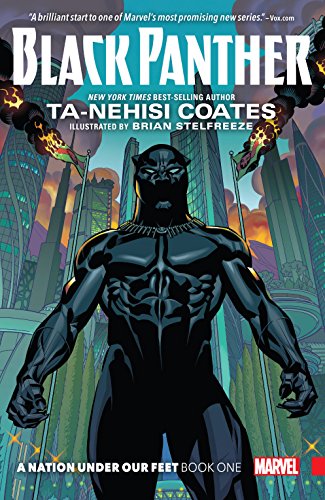Writer: Ta-Nehisi Coates
Artist: Brian Stelfreeze
 |
| via Amazon |
Title: Black Panther: A Nation Under Our Feet, Book Two
Writer: Ta-Nehisi Coates
Artists: Chris Sprouse, Karl Story, Laura Martin
 |
| via Amazon |
In 2016, a new Black Panther comic book series was launched with esteemed author/journalist Ta-Nehisi Coates as head writer. The two books listed above collect issues #1-8 along with three classic comics. Fantastic Four #52 (first published in 1966) features the original introduction of the Black Panther character while Jungle Action #6-7 (1973) introduce Killmonger, Black Panther's nemesis in both Coates's story and the blockbuster film.
Wakanda is in turmoil. A superhuman terrorist group called The People is encouraging the populace in armed rebellion. T'Challa (Black Panther) struggles to reunite the people and regain control of his nation. He even enlists some despicable nation-builders to consult though, thankfully, he doesn't follow their advice too far. The story challenges the very idea of monarchy, a long-standing conflict within the Black Panther idiom if the earlier issues provided are anything to go on.
The early comics, in particular, leave me confronting an uncomfortable question: is the Black Panther story racist? Is inclusion coming at a cost? I have no problem identifying Star Trek's "Code of Honor" episode as racist. Is Black Panther so different? I don't feel it's an issue with the more recent series. Having a black and racially conscious author like Coates and a black and racially conscious film director like Ryan Coogler guiding the character's arc in the 21st century is a good thing. But when white Stan Lee and Jack Kirby created Black Panther in 1966, perhaps the politics were sketchier.
As I work my way through the early Spider-Man issues, the lack of black and brown faces on the streets of New York City is both astonishing and preposterously unrealistic. The first black character I saw was a police officer in #23. So, inclusion was definitely an issue at the time. Still is half a century later, appallingly. Having any black face on the page or on the screen seems a revolution, let alone a character with nuance or even one the consumer is encouraged to root for. Once you've crossed that inclusion threshold, the slope gets slippery awful quick. Why not a story set in modern black America rather than going to Africa? And if you must go to Africa, why must everyone be outfitted according to Euro-American stereotypes? Is it even entirely Stan and Jack's fault? Were these the sorts of compromises that had to be made in order for the book to get published for fear of alienating what I assume was a predominantly white readership?
I can't find any articles examining the comic books along these lines, though there are plenty in regards to the movie. I want to focus on the comics for this post but for anyone interested, these folks write more thoughtfully on the matter than I could anyway:
- "Black Panther Is Great. But Let's Not Treat It as an Act of Resistance." - Khanya Khondlo Mtshali
- Kimberle Crenshaw
- "'Black Panther' Is Not the Movie We Deserve" - Christopher Lebron
- "Black Panther Is a Deeply Satisfying, and a Deeply Troubling Film, for What It Delivers and What It Does Not" - Hamid Dabashi
Was listening to a Star Trek podcast a while back that had Wil Wheaton as a guest. The subject of Code of Honor came up and Wheaton quickly backtracked to disassociate himself with that episode.
ReplyDeleteYes, the episode was racist but I seem to remember reading was that the writers and producers were trying present a world that wasn't dominated by white people. Which was the case all through Star Trek well into the TNG series.
This all goes back to what you mentioned in the post that at one time any black face on page or screen was a statement. Given that's an issue even now proves that we're still a dysfunctional group of naked primates.
Dysfunctional group of naked primates - no argument here!
DeleteI had similar reservations about the movie (and traditional conception of the character, which has never been revised). Interestingly, one of the things I learned in a book on US history I just finished was that there was a celebrated tanker division under Patton nicknamed Black Panther. Likely the predecessor to both the character and the movement that sprang up soon after (some fans have wondered if the character came second, but this isn't the case).
ReplyDeleteJust read up on the tanker division. Jackie Robinson was in the 701st!
Delete